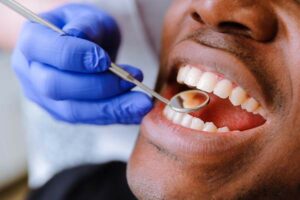The placement of a dental implant is a surgical procedure that although offers many advantages, they can also entail some complications. Even if the rate is comparatively low, implant failure is the most common risk. The success of a dental implant depends on patient-related health factors, implant characteristics, implant location, bone availability, and the dentist´s experience. Now, habitual nicotine smoking has a direct impact on general health and is therefore considered a risk factor in the success of a dental implant.
Dental implants are similar to a small screw drilled into a patient´s maxillary or mandibular bone that acts like a tooth root. Once placed, it should be left for some months to undergo a process in which bone particles grow into and around the implant, allowing it to be firmly in place. This is called osseointegration. If this integration process is inhibited or the natural wound healing is slow or nonexistent the risk of infection is much higher and the probability of implant failure proportional.
The second stage of the implant is the restoration. Here, the dentist exposes the implant that is now covered with gum or soft tissue, torques it to ensure stability, and then takes impression to create a crown, bridge, or denture. There are studies that assure this is the stage in which heavy smokers pose the highest risk. It is erroneous to believe that because an implant is restored and integrated, it can no longer fail. Implants require more oral health and care than do natural teeth. This is because accumulation of bacterial plaque around the implant invariably causes inflammation of the gum, bone loss, and sometimes infections. Actually, the most common cause of implant failure is peri-implantitis, the name of the condition described above.
Patients are encouraged to stop or decrease smoking factors because they pose a contraindication for almost every procedure, surgical or otherwise, performed on the oral cavity. Patients with these habits tend to produce and accumulate more bacterial plaque, restorations and composites stain more rapidly, and dental cavities are more prone to occur; dry socket after extraction is also common due to the constrained oxygen supply in the area. Also, patients with heavy smoking habits are much more prone to suffer periodontal and gingival illnesses and inflammation that cause bone loss. Since the success of dental implants is directly related to an adequate quantity and quality of bone, any factor that may influence negatively in it will be considered a risk factor. Finally, because of the reduced oxygen flow in the blood, it is common to have heavy smokers develop bacterial infections due to delayed wound healing.
The risk factors for implants are more critical in those related to the patient’s health, cleanliness, and habits. Some studies report between 6-20 percent implant failures in patients with habitual nicotine use over those who don’t. In an effort to decrease the risks, most dentists ask patients to stop their smoking habits for at least one week prior to surgery and two months after implant placement. If you are interested on getting dental implants and acknowledge smoking habits, we at Costa Rica Dental Team encourage you to contact us in order to discuss your case and evaluate your options.




